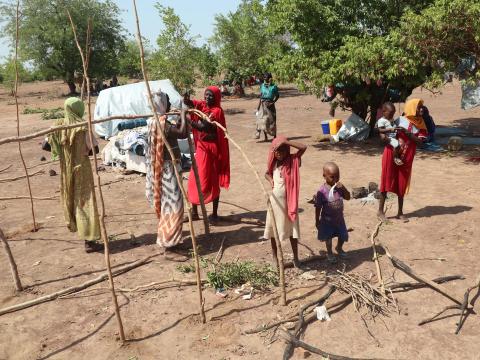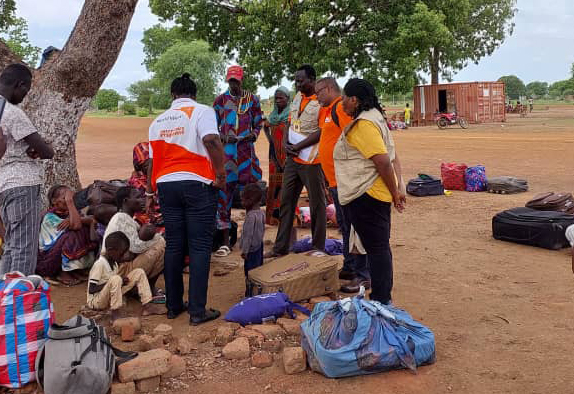Abuk's Unknowns: A young mother's escape from the conflict in Sudan

World Vision South Sudan country director, Mesfin Loha, reflects on how it feels to lose home and embark on a tumultuous journey searching for refuge and dealing with the unknowns. Here he shares the story of Abuk, a refugee from Sudan.
Homes are places of stability, safety, and a sense of belonging. When these are shattered, due to conflict, as in the case of Sudan, people are left with no choice but to flee. This means not just being uprooted from what was familiar. It also means wanting to stay alive no matter the cost, despite not knowing what lies ahead, losing almost everything, including families and friends, and dealing with the possibility of being unable to return and be reunited with loved ones. Such is the story of Abuk and many others transiting and seeking refuge in South Sudan.
"I don't know where I am going" was her first response when I met Abuk, a 26-year-old mother of five, at Aweil airstrip in Northern Bahr El-Ghazel state of South Sudan during my recent visit to the region to check firsthand the situation of the refugees, returnees, and host communities affected by the ongoing conflict in neighboring country Sudan, and how World Vision and other humanitarian partners are responding to their needs. Abuk had just got off an International Organisation for Migration-supported flight from Renk in Upper Nile state, where most of the displaced people from Sudan enter the country through Renk’s border point.

During my brief conversation with Abuk, I learned she had lived in Khartoum her whole life. There, she and her husband, a small shop owner, raised their children. They were living normal lives until the conflict erupted on 15 April. That was the last time she saw her husband. Her husband was out for work that day and she has never seen or heard from him since then. Confused about what to do, she went to her neighbor, who was contemplating what to do next. A few days later, her neighbor left for South Sudan. This made Abuk even more confused about what to do. She was torn between staying and leaving. She did not know where her husband was or whether he would return. She was also still determining if she would make it to South Sudan alone with her five young children.
Nearly three weeks since the fighting in Sudan started, Abuk mustered all her courage and decided to join a group heading to South Sudan. It was 06 May. An elderly woman offered to help carry her children and shouldered the fee for a means of transport. Finally, after eight days of grueling journey with frequent checkpoints and interruptions, she made it to Renk in Upper Nile state through the Wunthou border crossing.
The transit center in Renk was a safe haven, albeit with minimal services, for the five weeks she spent there. "I am glad my children were given some food, even though not enough for all five of them. They are alive, and their future is in the hand of God," she uttered.
Abuk's biggest unknown is "Where could I go?" She was given the telephone numbers of her in-laws in Aweil East County and the names of people she never met before. Abuk only speaks Arabic, but she thinks this is less of her problem now.
As Abuk contemplated what lies ahead in a place unknown, in the possibility of meeting her in-laws for the first time, in traversing unfamiliar terrains, and in not knowing whether she will ever see the father of her children again, she and her children boarded a truck to the dusty trails of rural Aweil.
Life changed drastically for Abuk, especially her children, and millions of others displaced because of the raging conflict, not just in Sudan or here in South Sudan but also in many parts of the world.
They all face unimaginable suffering before, during, and even after their journey to the borders. They've witnessed and experienced violence, including extortion and looting. If only we could listen to all their stories of their journey to survival, our hearts would be crushed to many thousand pieces. Sadly, their stories and voices are often muffled and drowned by perhaps louder and more spectacular world events.
As of 27 June, the UN Office for the Coordination of Humanitarian Affairs (UNOCHA) estimates that nearly 140,000 people have arrived in South Sudan since the conflict in Sudan started in April, and the ‘number of arrivals is projected to increase as the conflict in Sudan continues.’ Of this number, the majority are vulnerable people, 'including unaccompanied and separated children, the elderly, persons with disabilities, those with urgent medical needs, single- or female-headed households, and pregnant women.'
To Abuk’s question: ‘Where could I go?’ We, too, should ask ourselves, ‘What more can we do? How far can we go further with them?’
One can only hope that the warring factions will take necessary actions to end the conflict soon. The time to act is now. At the very least, we should not forget the plight of the displaced people. It takes a village, a nation, and us all to resettle and support people like Abuk to make a dignified start. This requires more commitment from the governments, humanitarian and development partners, and the international community to end the conflicts and ensure more funding resources are allocated to humanitarian aid.